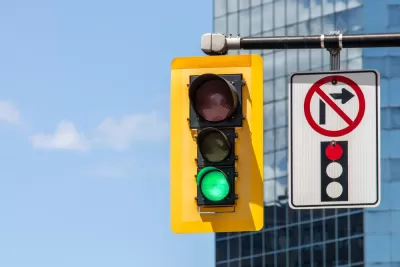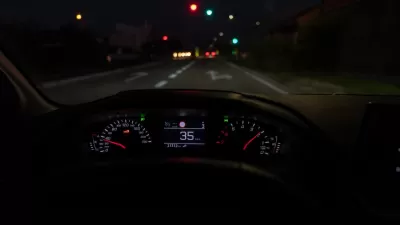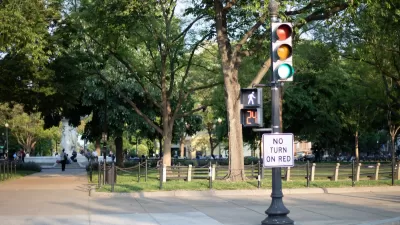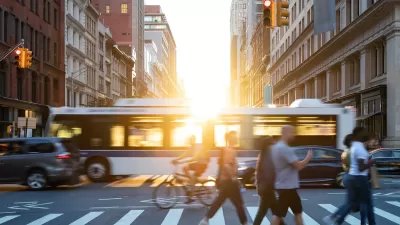Born out of the oil crisis of the 1970s, the practice of turning right on red lights is a uniquely American—and uniquely dangerous—custom.

Most American drivers don’t think twice about making a right turn on a red light (RTOR). For decades, it’s been the status quo in many cities. But as Abigail Weinberg explains in an illuminating Slate article, the habit is relatively new and, to many experts, obsolete and dangerous. According to Weinberg, “The data on right-turn-on-red crashes might be scarce, but the existing studies suggest that these types of collisions—while rare—frequently involve a pedestrian or cyclist.”
The practice was born out of the 1970s oil crisis, when the government sought to reduce emissions by minimizing idling at red lights. “A provision of the 1975 Energy Policy and Conservation Act said that, in order for states to receive federal assistance for mandated conservation programs, they had to enact ‘a traffic law or regulation which, to the maximum extent practicable consistent with safety, permits the operator of a motor vehicle to turn such vehicle right at a red stop light after stopping.’”
However, the policy has never been proven to significantly reduce emissions or idling time. “Take into account the growing number of hybrid and electric cars, and RTOR makes even less sense.” Meanwhile, electric vehicles have the potential to increase RTOR crashes due to their quicker acceleration.
Quoting transportation engineer Bill Schultheiss, Weinberg concludes that making right turns on red illegal, while a “minor enough inconvenience” for drivers, could be “a baby step in creating an urban environment that is more supportive of walking, bicycling, and transit.”
Today, more cities are moving to ban RTOR. New York City has a ban, and Washington, D.C. could soon follow, if legislation passed by the district’s council is approved by the mayor and Congress. Ann Arbor, which delayed its vote on the issue earlier this year, voted to ban RTOR at 50 intersections in its downtown.
FULL STORY: The Surprising History—and Deadly Consequences—of Right Turn on Red

Manufactured Crisis: Losing the Nation’s Largest Source of Unsubsidized Affordable Housing
Manufactured housing communities have long been an affordable housing option for millions of people living in the U.S., but that affordability is disappearing rapidly. How did we get here?

Americans May Be Stuck — But Why?
Americans are moving a lot less than they once did, and that is a problem. While Yoni Applebaum, in his highly-publicized article Stuck, gets the reasons badly wrong, it's still important to ask: why are we moving so much less than before?

Research Shows More Roads = More Driving
A national study shows, once again, that increasing road supply induces additional vehicle travel, particularly over the long run.

Judge Halts Enforcement of Anti-Homeless Laws in Grants Pass
The Oregon city will be barred from enforcing two ordinances that prosecute unhoused residents until it increases capacity and accessibility at designated camping sites.

Advancing Sustainability in Los Angeles County Schools
The Los Angeles County Office of Education’s Green Schools Symposium brings together educators, students, and experts to advance sustainability in schools through innovative design, climate resilience strategies, and collaborative learning.

Using Old Oil and Gas Wells for Green Energy Storage
Penn State researchers have found that repurposing abandoned oil and gas wells for geothermal-assisted compressed-air energy storage can boost efficiency, reduce environmental risks, and support clean energy and job transitions.
Urban Design for Planners 1: Software Tools
This six-course series explores essential urban design concepts using open source software and equips planners with the tools they need to participate fully in the urban design process.
Planning for Universal Design
Learn the tools for implementing Universal Design in planning regulations.
City of Moreno Valley
Institute for Housing and Urban Development Studies (IHS)
City of Grandview
Harvard GSD Executive Education
NYU Wagner Graduate School of Public Service
City of Cambridge, Maryland
Newport County Development Council: Connect Greater Newport





























